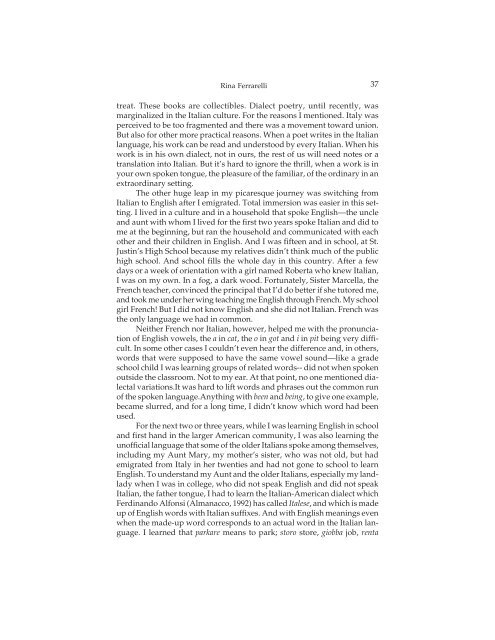Journal of Italian Translation
Journal of Italian Translation
Journal of Italian Translation
You also want an ePaper? Increase the reach of your titles
YUMPU automatically turns print PDFs into web optimized ePapers that Google loves.
Rina Ferrarelli<br />
treat. These books are collectibles. Dialect poetry, until recently, was<br />
marginalized in the <strong>Italian</strong> culture. For the reasons I mentioned. Italy was<br />
perceived to be too fragmented and there was a movement toward union.<br />
But also for other more practical reasons. When a poet writes in the <strong>Italian</strong><br />
language, his work can be read and understood by every <strong>Italian</strong>. When his<br />
work is in his own dialect, not in ours, the rest <strong>of</strong> us will need notes or a<br />
translation into <strong>Italian</strong>. But it’s hard to ignore the thrill, when a work is in<br />
your own spoken tongue, the pleasure <strong>of</strong> the familiar, <strong>of</strong> the ordinary in an<br />
extraordinary setting.<br />
The other huge leap in my picaresque journey was switching from<br />
<strong>Italian</strong> to English after I emigrated. Total immersion was easier in this setting.<br />
I lived in a culture and in a household that spoke English—the uncle<br />
and aunt with whom I lived for the first two years spoke <strong>Italian</strong> and did to<br />
me at the beginning, but ran the household and communicated with each<br />
other and their children in English. And I was fifteen and in school, at St.<br />
Justin’s High School because my relatives didn’t think much <strong>of</strong> the public<br />
high school. And school fills the whole day in this country. After a few<br />
days or a week <strong>of</strong> orientation with a girl named Roberta who knew <strong>Italian</strong>,<br />
I was on my own. In a fog, a dark wood. Fortunately, Sister Marcella, the<br />
French teacher, convinced the principal that I’d do better if she tutored me,<br />
and took me under her wing teaching me English through French. My school<br />
girl French! But I did not know English and she did not <strong>Italian</strong>. French was<br />
the only language we had in common.<br />
Neither French nor <strong>Italian</strong>, however, helped me with the pronunciation<br />
<strong>of</strong> English vowels, the a in cat, the o in got and i in pit being very difficult.<br />
In some other cases I couldn’t even hear the difference and, in others,<br />
words that were supposed to have the same vowel sound—like a grade<br />
school child I was learning groups <strong>of</strong> related words-- did not when spoken<br />
outside the classroom. Not to my ear. At that point, no one mentioned dialectal<br />
variations.It was hard to lift words and phrases out the common run<br />
<strong>of</strong> the spoken language.Anything with been and being, to give one example,<br />
became slurred, and for a long time, I didn’t know which word had been<br />
used.<br />
For the next two or three years, while I was learning English in school<br />
and first hand in the larger American community, I was also learning the<br />
un<strong>of</strong>ficial language that some <strong>of</strong> the older <strong>Italian</strong>s spoke among themselves,<br />
including my Aunt Mary, my mother’s sister, who was not old, but had<br />
emigrated from Italy in her twenties and had not gone to school to learn<br />
English. To understand my Aunt and the older <strong>Italian</strong>s, especially my landlady<br />
when I was in college, who did not speak English and did not speak<br />
<strong>Italian</strong>, the father tongue, I had to learn the <strong>Italian</strong>-American dialect which<br />
Ferdinando Alfonsi (Almanacco, 1992) has called Italese, and which is made<br />
up <strong>of</strong> English words with <strong>Italian</strong> suffixes. And with English meanings even<br />
when the made-up word corresponds to an actual word in the <strong>Italian</strong> language.<br />
I learned that parkare means to park; storo store, giobba job, renta<br />
37
















